7 better alternatives to Google Drive, OneDrive, or iCloud
Cloud storage is a vital part of most people's digital lives these days, but why should you keep using Google Drive, OneDrive, or iCloud, when better and more private alternatives exist?
Cloud storage is pretty hard to avoid these days, and one of the biggest providers is Google, a company not known for its focus on privacy. Microsoft, with OneDrive, and Apple, with iCloud Drive are also big providers, that most people use, depending on their smartphone or desktop operating system of choice.
Fortunately, Google Drive, or any big tech drive storage is one of the easiest parts of the ecosystem to replace, so let’s look at a bunch of alternatives, so you can finally get your files out of Big tech’s computers.
Nextcloud
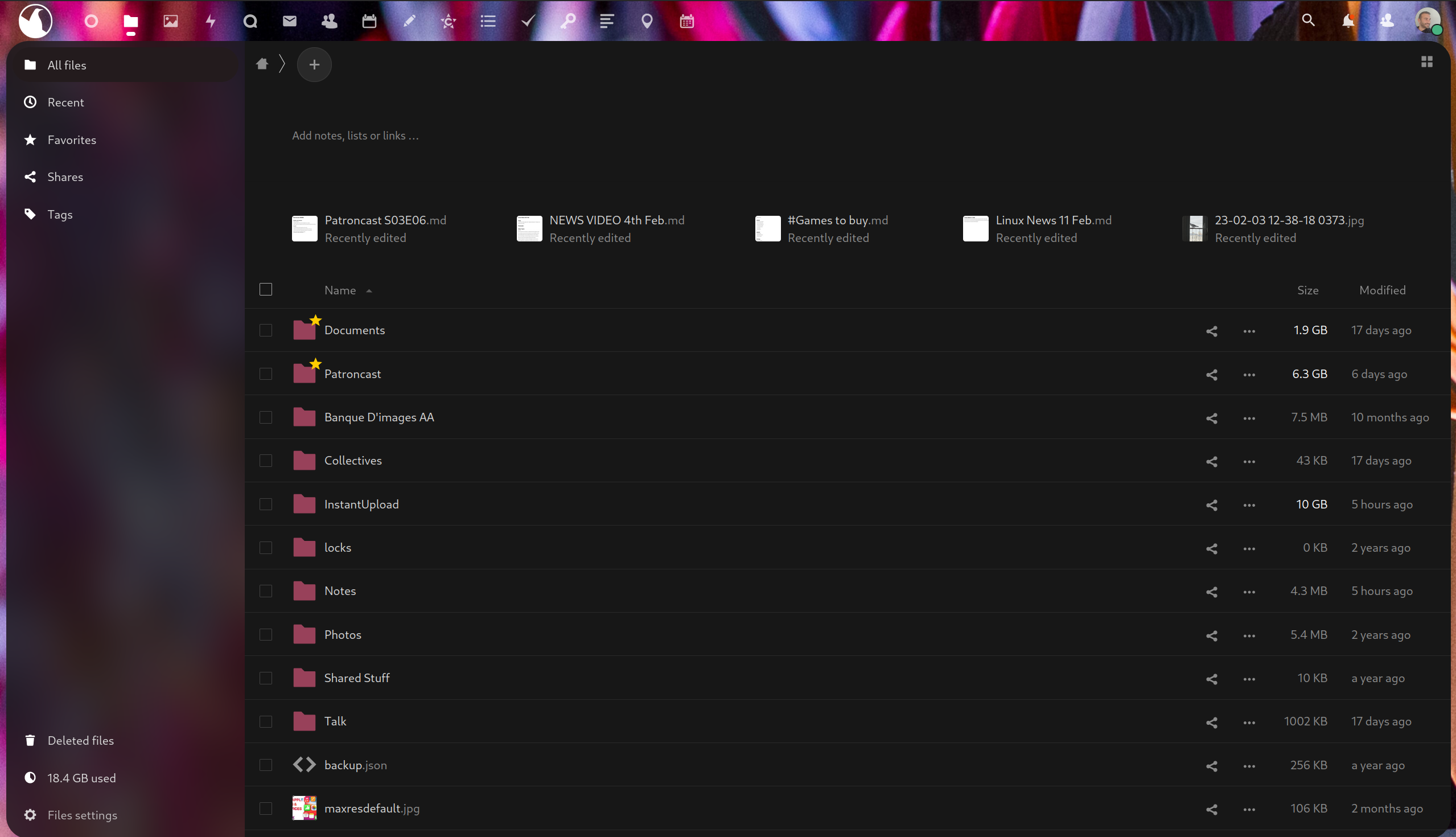
And how could I not start with Nextcloud.
Nextcloud isn’t JUST cloud storage, but it’s a very easy way to have complete control over your files and who can access them. Nextcloud can be self hosted on a home server, or a raspberry pi connected to as much storage as you want, or you can rent a server from any provider, like Linode.
That’s what I do personally, all my stuff is on Nextcloud, and I host it on a Linode instance. In any case, Nextcloud file storage is pretty powerful. It handles folders, you can favorite files and folders to get back to them easily, you can tag anything you like, you can share anything either with selected people, or with a public link, you can even add comments to any file, and it supports versioning as well to restore older versions if you want.
And thank goodness for that, because while I was writing this exact article in Nextcloud notes, I accidentally selected everything and erased it, and quit the app. Without versioning, I would have had to rewrite the whole thing.
On top of that, you can also mount that storage as webdav, in any good file manager. On Linux, with GNOME and KDE, this happens automatically when you configure a nextcloud account in the online accounts settings.
And of course, you have a desktop client that lets you sync files either from a Nextcloud folder, or even from outside that folder, to make sure your files are where you want them.
And there’s a mobile app as well to auto upload pictures, and manage all that storage, write notes, and generally waste time and marvel at how good it is to have your own server.
Nextcloud is open source, updated often, and it can do plenty more than just file storage, including having your own online office suite like OnlyOffice or Collabora, for free, that’s perfectly integrated with the storage, and supports collaborative editing of documents.
If you want to self host, or at least make sure YOU control where the files go, you can’t really do any better than Nextcloud
SyncThing
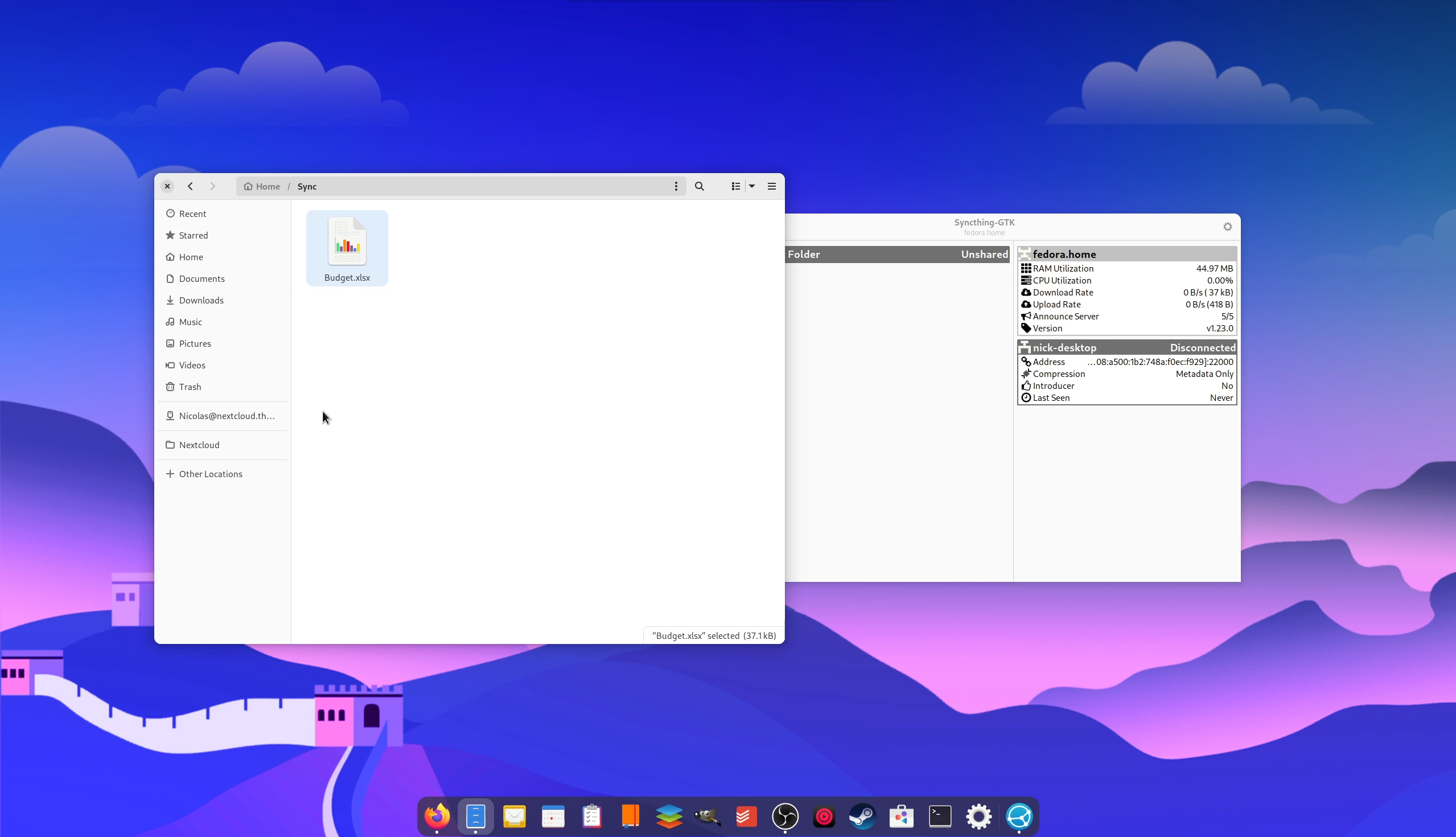
Syncthing isn’t exactly cloud storage, it doesn’t store files on a cloud server, it just syncs them from one computer to the other, in real time. So you setup syncthing on your laptop and your desktop, and it will send files back and forth between both devices, without any intermediary in between.
Of course, it has a few drawbacks, like not having a copy accessible online from a web browser, no file sharing with others, and it won’t download anything to one of your devices if all other devices are turned off, but it also means you don’t have to pay anything: no cloud subscription, the app is free of charge and open source, and it works over local network or just over the internet if your devices aren’t in the same location.
It has clients for every OS, including an official one for Android, an unofficial one for iOS, and even clients for BSD. Yes, even BSD, all the BSDs, Free, Open, Net, dragonfly, and macOS, although can we really count that one as BSD?
If what you need isn’t necessarily storage that can be shared with others, but you just want a way to have all your files on all your devices, SyncThing is a great option.
ProtonDrive
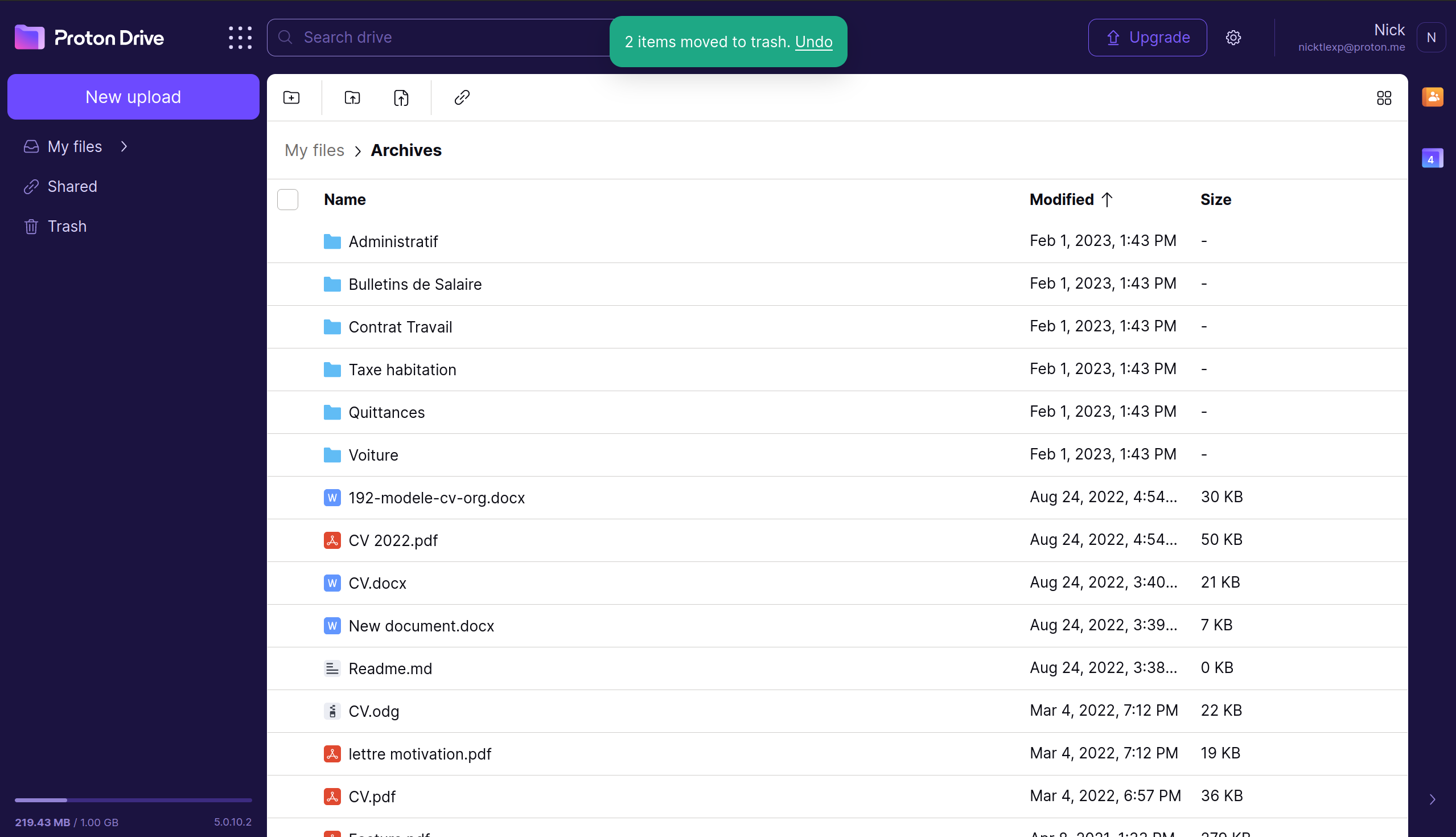
If you’re already a ProtonMail customer, you might just want to look at Proton Drive.
It’s an end to end encrypted solution, hosted in Switzerland, with relatively strong privacy laws, that don’t really matter since everything is encrypted anyways, it’s not like someone could look at what you stored, since files are encrypted on your device before being sent to the cloud.
It’s also open source, and it obviously integrates well with the other Proton tools, like Mail or Calendar. Even though it’s encrypted, you can still share files with others without file size limits, as well as password protect files, define expiration dates for links, and more.
Of course, you’ll have to pay, because you only get 1GB of free storage, but 200Gigs are 3 euros 99 per month, and 500 Gigs are 9.99.
It’s more expensive than Google Drive, for sure, but only by 1 euro a month for 200 Gigs, which should be enough for most people. If not, seriously, what do you store in there, my lifetime of photos and videos and ALL my files only occupy about 60 Gigs.
The price gap widens for the 500 gigs tier, because for the same price, you get 2TB from Google. But also, Google Storage isn’t encrypted<.
Proton Drive will probably be a no brainer for people already using Proton mail, and for people who want to replace multiple Google tools at the same time: mail, calendar AND drive.
Cozy Cloud
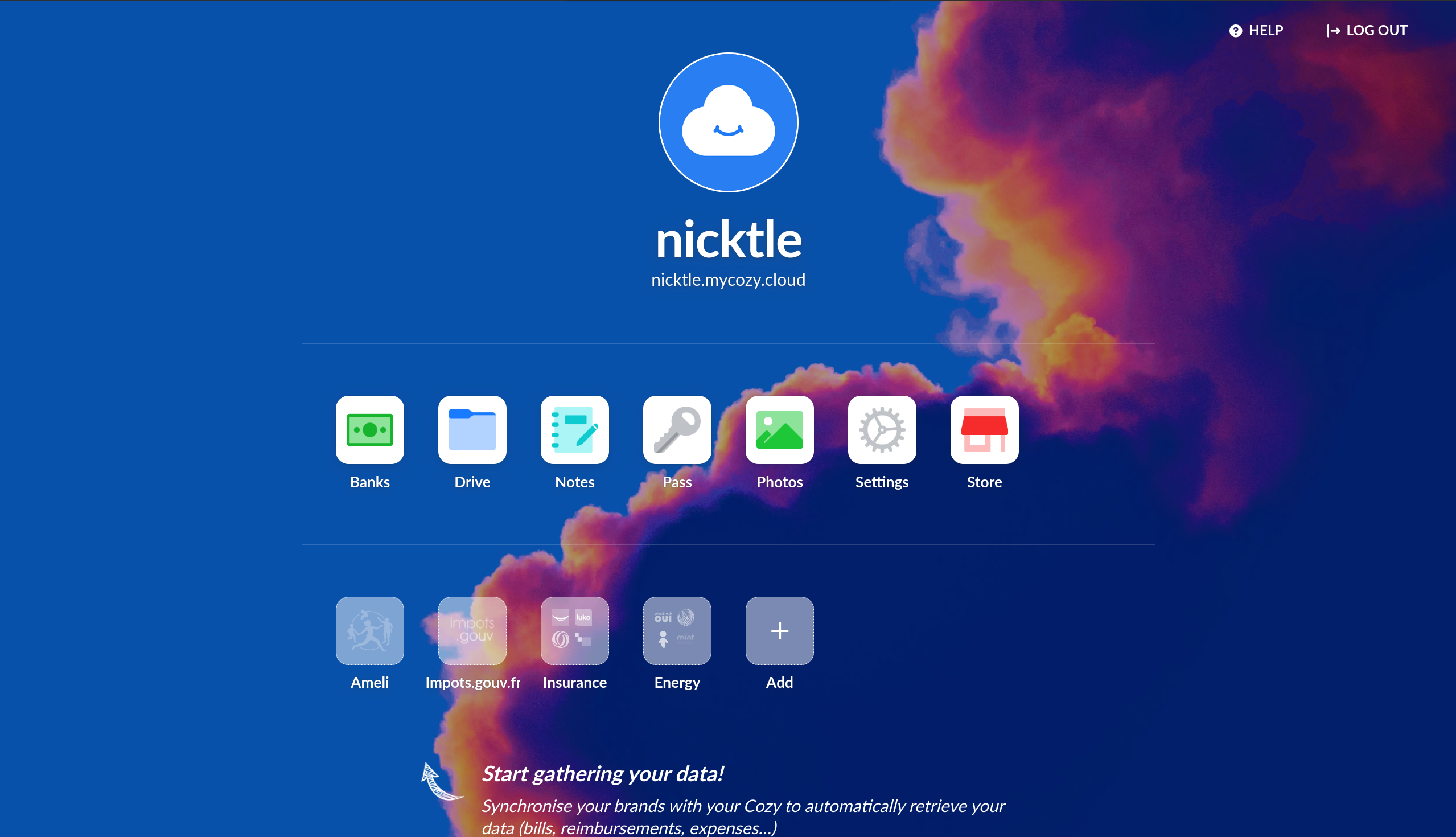
Another open source alternative is Cozy Cloud, and also it’s French, so, you gotta love it. At least I do. French people hate everything, except french things. Although, now that I think of it, we also hate French things.
COoy Cloud is a suite of tools, but the main one is Cozy Drive, which is, you guessed it, Cloud storage with sharing options. It’s available for Android, iOS, Linux, macOS and Windows, and it gives you 5GB for free, with additional tiers at 50 GB for 2 euros 99 per month, and 1 TB for 9 euros 98. Still more expensive than Google, but also more private.
It also has auto import features from your phone camera roll to your drive, and can also automatically import certain documents from more than 100 providers, like your bills, health refunds, bank statements, and more, if you want.
In terms of privacy, they’re very clear about what they collect: only your traffic data from the website. All the files are completely private.
They also have other apps that collect some amount of data, like Cozy Banks, that will automatically pull your bank statements in one single place to manage your budget, or Cozy Notes for, well, note taking, and Cozy Pass for storing passwords, but these are completely optional.
Just because they’re french doesn’t mean you can’t use it if you don’t live there. Of course, it’s only called Cozy Cloud if it comes from the Cozy region of France
pCloud
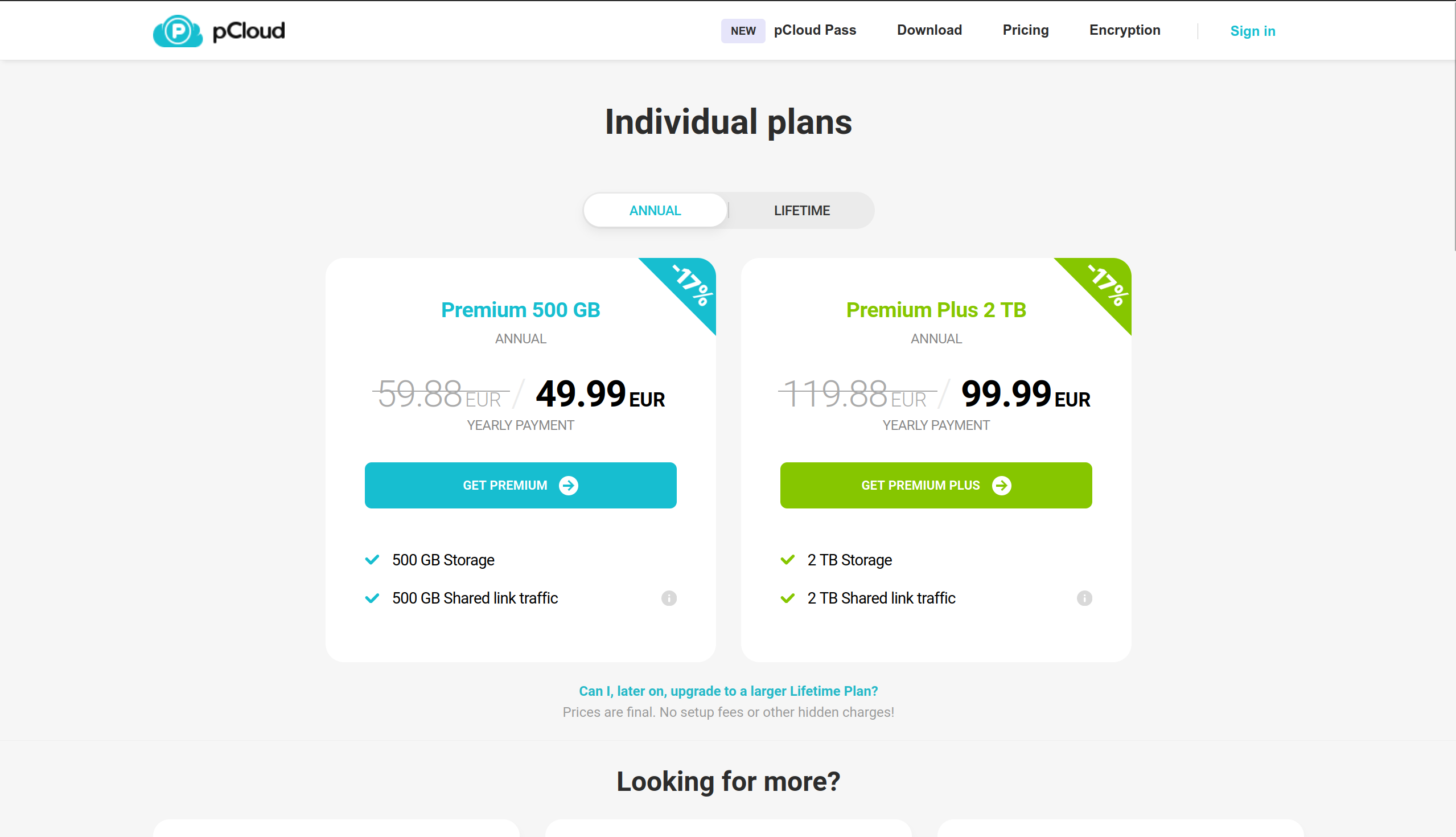
pCloud is an option I used extensively in the past for all my cloud storage. It’s not open source, but it has optional encryption features if you want to make sure that you’re the only one that can look at your stuff. They’re on the affordable side, with 500Gigs costing you 50 euros per year, or about 4 euros per month, and 2 terabytes for 100 euros a year, or a bit more than 8 euros per month.
They also have lifetime plans that will cost you more once, but without any further payments, but lifetime plans are something I tend to not trust, because the company could just decide to not honor it or find a loophole.
Ask Filmora users how well lifetime plans worked out: even though it looks like the company backed off, they could absolutely just have walked back on that policy, and customers would have had to pay again.
pCloud has clients for Linux, windows, macOS, iOS, and Android, and even a command line version if you prefer. It will let you backup your PC to the cloud, sync files and folders between computers, from anywhere on your disk, you’re not limited to a single folder, and you can share files and folders with anyone.
And they also have a password manager now if you want that. Of course, pCLoud isn’t open source, so it’s up to you if you trust the promise or not. I used it for about 2 years, and I was pretty happy with it, never really had an issue
MEGA

If what you need is massive storage space and you don’t want to self host, then I think Mega is your only option. Their base plans are more expensive than others, at 5 euros per month for 400 Gigs, but they can go up to 16 Tb for 30 euros per month, which is a LOT of storage for not that much money, considering. The 2 TB plan is on par with other options, at 10 euros per month.
Now, if you can look past the “Kim DotCom” origins of this service, which are unsavory at best, you’ll be pleased to know that the company is now pretty transparent, publishing reports about takedown requests and the like.
Mega isn’t open source either, they publish some source code for their clients, but it’s under a proprietary source license, that only lets people review and comment, but not contribute or modify or redistribute. Still, it lets people check for vulnerabilities or backdoors in the clients, although the server part is fully opaque.
They have apps for all platforms, including Linux, and smartphones, and you can share files with anyone, sync from your computer or phone automatically, and everything is end to end encrypted. They also have a chat app, also end to end encrypted, and a backup solution.
Whether you trust Mega or not is your choice, but it bears its name well. If what you need is more than a few million megas, then MEGA is for you
Zoho

I can’t conclude this video without mentioning Zoho. If you don’t really care all that much about privacy or open source, but you still want to ditch big tech, then Zoho is probably your best bet. they have replacements for EVERYTHING google does, and a lot more on top of that, and prices are relatively inexpensive.
Now, of course, it’s meant more for teams, because all plans start assuming you have 3 users at least, but even with that, the basic 1 TB plan will cost you 7,5€ per month, and 3 TB will run you 13.5€ per month. It’s not ridiculous.
And when I say you get everything, you DO GET EVERYTHING. File storage, sharing, collaboration, a full office suite that’s absolutely a Google Docs competitor, mobile apps, desktop syncing, with apps for every OS that exists, plus file versioning, encryption, and you can even get a free 5 GB storage plan if you want to try it out.
And that’s just the file and the office suite. You can also get an email address with a fantastically powerful webmail, a rich text notebook, a forms builder, project management tools, a CRM, anything.
And if you trust the company, they also say they comply with GDPR, and their privacy policy says they don’t share any information with anyone, except with employees that have a real need to access it, like customer support.
Honestly, if I didn’t use Nextcloud, I would probably use Zoho, because it would just be a full complete workspace for everything
Other options
And of course, these are but a selection, there are tons more that are open source, or proprietary, some you probably know about like DropBox, some you might not, like SeaFile, or Infomaniak but the selection I picked should cover basically every use case for Google Drive, and every price point people would be willing to pay, with solutions you can self host, and solutions without a cloud server
Because as they say, the cloud is just someone else’s computer, unless it’s yours.
My preference currently goes to Nextcloud, because it’s really easy to either run a server from a VPS provider like Linode, or to self host it at home, with as much storage as you want, but you get to pick what you prefer!
So, no reason to keep storing your files on Google’s servers. Just pick anything else, and be more secure, and more private
Help support what I do
If you want to keep this website going, please consider subscribing on Patreon, you will get a bunch of cool advantages in the process, like a weekly podcast and the right to vote on video topics I cover on Youtube!



